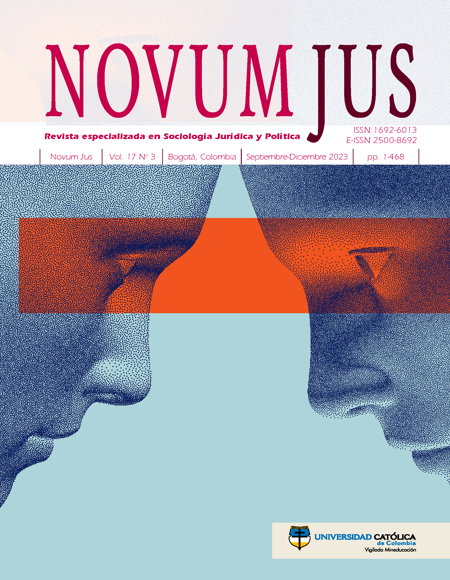
This work is licensed under a Creative Commons Attribution-NonCommercial 4.0 International License.
Authors who publish with this journal agree to the following terms:
- Authors retain copyright and grant the journal right of first publication with the work simultaneously licensed under a Creative Commons Attribution Non-Commercial License that allows others to share the work with an acknowledgement of the work's authorship and initial publication in this journal.
- Authors are able to enter into separate, additional contractual arrangements for the non-exclusive distribution of the journal's published version of the work (e.g., post it to an institutional repository or publish it in a book), with an acknowledgement of its initial publication in this journal.
- Authors are permitted and encouraged to post their work online (e.g., in institutional repositories or on their website) prior to and during the submission process, as it can lead to productive exchanges, as well as earlier and greater citation of published work (See The Effect of Open Access).
Abstract
Open strategic autonomy is the new paradigm that characterizes the European Union's Common Foreign and Security Policy (CFSP), an innovative axis that seeks to define the objectives and horizons of the European Union (EU) in a globalized and changing world. The open strategic autonomy, unlike its previous version which did not add the adjective open, aims to maintain the stability and well-being of European citizens,
involving non-state actors and civil society, while guaranteeing the autonomy of the Community project. The purpose of this study is to define what is meant by open strategic autonomy and to focus the analysis on its challenges, opportunities, and strengths. In this way, it will be possible to identify the EU's recent shift in security and defense, and to show how this new strategy is not only focused on this area, but also encompasses and influences all EU policies.Open strategic autonomy is presented as an impetus for European and global cooperation, allowing the EU to strengthen its leadership capacity on international issues related to industrial policy, international trade, the environment, migration, digitalization and, of course, security and defense. It is therefore a concept that will mark the EU's way of acting in the coming decades; a roadmap that it will try to implement in order to face the new global scenario, much more changing and uncertain than that of the era known as the liberal peace, which in its time augured the theses of the end of history.

References
-124. http://www.uajournals.com/cisdejournal/es/revistaes/numeros-anteriores.html?layout=edit&id=193 (acceso julio 15, 2023).
Soroeta, Juan. “La posición de la Unión Europea en el conflicto del Sahara Occidental, una muestra palpable (más) de la primacía de sus intereses económicos y políticos sobre la promoción de la democracia y de los derechos humanos”. Revista de Derecho Comunitario Europeo, núm. 34 (2009): 823-864. https://www.cepc.gob.es/publicaciones/revistas/revista-de-derecho-comunitario-europeo/numero-34-septiembrediciembre-2009/la-posicion-de-la-union-europea-en-el-conflicto-del-sahara-occidental-unamuestra-palpable-mas-de-la-1 (acceso julio 5, 2023).
Teixeira, Josélia Elvira y Ana Teresa Tavares-Lehmann. “Industry 4.0 in the European union: Policies and national strategies”. Technological Forecasting and Social Change 180, (2022): 1-12, https://doi.org/10.1016/j.techfore.2022.121664 (acceso julio 18, 2023).
Unión Europea. “Tratado de la Unión Europea”. Maastricht: Diario Oficial de la UniónEuropea núm. C 191/1, 29 de
julio de 1992. https://eur-lex.europa.eu/legal-content/ES/TXT/PDF/?uri=OJ:C:1992:191:FULL&from=LV (acceso agosto 2, 2023).
Vezzoni, Rubén. “Green growth for whom, how and why? The REPowerEU Plan and the inconsistencies of European Union energy policy”. Energy Research & Social Science 101, (julio 2023): 1-15. https://doi.org/10.1016/j.erss.2023.103134 (acceso julio17, 2023).
Viola, Pasquale. “La contribución científica del Intergovernmental Panel on Climate Change al Pacto Verde Europeo: introducción a la European Climate Law”. Revista de Direito Administrativo & Constitucional, núm. 81 (2020): 55-68. http://dx.doi.org/10.21056/aec.v20i81.1436 (acceso julio 5, 2023).





















